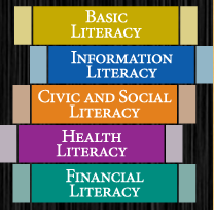Much of what we talk about when we discuss the literacies in PA Forward concerns how we can foster those competencies in our patrons. We rarely discuss, though, how each of the five literacies — information, health, financial, civic, and basic — furthers our own personal and professional development and therefore has some bearing on our capacity to do our jobs well. When so many libraries (and librarians) are short on the financial and time resources that most formal professional development opportunities necessitate, how we can further our own proficiency within the PA Forward literacies as relates to our profession?
The list below provides different avenues by which stay on top of current information, develop new skills, stay organized, and remain active in our communities.
Electronic discussion lists – Also known as listservs, these lists are basically email conversations among people with a shared interest. Trying to solve a problem but don’t know how to start? Found a cool resource you want to share with your professional peers? Looking for a new job? Library listservs can be a great way to extend your network and learn new, useful things in the process. A full, categorized list of ALA listservs is available here. If you’re a part of any other professional organization, chances are they have a number of listservs you can subscribe to.
Feed readers – Rather than sporadically bouncing between your favorite news and personal interest sites, consider using a feed reader to aggregate the web sites you visit. Read, save, and organize entries on your desktop and devices. My favorite is Feedly, but Feedbin, Inoreader and Newsblur are good options too depending on your needs.
Funded/subsidized programs – Between travel, hotel, food, and registration fees, attending conferences can be prohibitively expensive. But the biggest library conferences — ALA and ACRL — both offer scholarships to help defray or fully cover the cost of funding for attendees. These awards are distributed through an application process, so be sure to give yourself (and your recommender, if required) enough time to write a compelling essay on why you merit the award.
Additionally, look for workshops or seminars that provide full funding for all its participants. For example, the Institute for Research Design in Librarianship provides a full week (in LA, no less!) of housing, food, transportation, and training for academic librarians interested in conducting research. More local opportunities include ILead, a technology immersion program, and PALS, a partially subsidized leadership development seminar.
There are also regional and special-group level library organizations that provide funding for its members for development events. For example, I was able to attend PALS through the generous sponsorship of my local chapter of PaLA. The Office of Commonwealth Libraries also distributes professional development grants.
Also, whether you’re a public, academic, or special librarian, your institution may have professional development funding available through avenues outside of the library, such as Human Resources or your Friends of the Library, as an employee benefit.
(Note: While some of the application deadlines for these have passed, if you see something you’re interested in, put it on your calendar for the next application cycle so you don’t forget! Most of these types of awards occur annually, so it’s good to keep them on your mental horizon to be prepared).
Book reviewing – If you’re trying to build up your resume or CV, seeking out opportunities for book reviewing is a good way to contribute to your field and learn something new. If you have a favorite scholarly journal, message the editor and see if they have books that need reviewed. (You’d be surprised at how many do!) If your reading habits lie more in the domain of fiction or non-fiction, apply to be a reviewer at a publication like Library Journal or Booklist.
Podcasts – Haven’t jumped on the podcast trend yet? Well, now is as good a time as any! Because, seriously, podcasts might change your life. Use a podcast to learn a language to communicate with your ELL (English language learner) patrons (I highly recommend The Coffee Break Language Learning series), or to hear about the latest trends in literary culture and commercial publishing (Book Riot is great!) Most podcasts are available through the Apple or Google Play store.
MOOCS and other online learning – There have been various dubious pronouncements about the utility of online learning, but the MOOC (short for Massive Open Online Course) trend seems to be going pretty strong, with sites like Coursera and EDX expanding their offerings. With MOOCs, you can build valuable skillsets via classes on Project Management or Entrepreneurship, refine your tech skills and learn Java or C++, or become a content expert by taking courses on specific subjects like psychology or novel writing. If you do come away having learned a lot, consider paying it forward to your patrons by teaching a class or a series of classes on your new area of expertise.
For library-specific online courses, Library Juice Academy is a great provider, though at a (reasonable) cost.
 While many of the suggestions above have examples that are specific to librarianship, they have relevance to most careers — so adapt and present what may be a good fit for your patrons! For more ideas on how to promote the PA Forward in your library, visit the PA Forward Commons and be sure to add your programs to the database by completing the PA Forward Commons Submission Form!
While many of the suggestions above have examples that are specific to librarianship, they have relevance to most careers — so adapt and present what may be a good fit for your patrons! For more ideas on how to promote the PA Forward in your library, visit the PA Forward Commons and be sure to add your programs to the database by completing the PA Forward Commons Submission Form!


